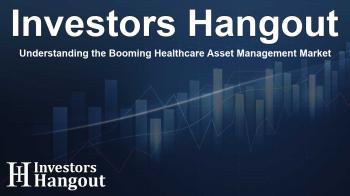Understanding the Booming Healthcare Asset Management Market

Healthcare Asset Management Market Overview
The Healthcare Asset Management market has been experiencing remarkable growth, with projections estimating its value to exceed USD 166.82 billion. This rapid expansion is driven by an impressive compound annual growth rate (CAGR) of 23.1% from 2024 to 2032. This article delves into the reasons behind this growth and what the future holds for the industry.
Market Driving Forces
The surge in the adoption of sophisticated tracking technologies is a major factor driving this market's expansion. Healthcare providers are increasingly focused on enhancing patient safety and ensuring operational efficiency, making asset management systems invaluable. The integration of Internet of Things (IoT) and Artificial Intelligence (AI) has revolutionized asset management by facilitating real-time tracking and predictive maintenance, ultimately leading to improved operational efficiency.
Impact of Regulatory Changes
Moreover, government regulations and initiatives have pushed healthcare facilities to adopt these systems diligently. In the US, for example, stricter FDA regulations regarding medical device tracking have highlighted the importance of asset management in reducing medical errors. The FDA's findings, which indicate that effective asset management could decrease medical mistakes by up to 55%, emphasize the crucial role these systems play in promoting patient safety.
Financial Implications on Healthcare Providers
Additionally, the financial strain on healthcare systems due to previous global health challenges, including the significant losses observed during the pandemic, has incentivized organizations to invest in more sophisticated asset management solutions. This investment aims to optimize resource allocation and reduce operational costs. The American Hospital Association reported substantial financial burdens during this period, which has catalyzed the transition to efficient asset management.
State-Sponsored Investments
Government initiatives also facilitate growth in this sector. In recent years, massive funding has been allocated to promote digital health technologies. For instance, the Department of Health and Human Services dedicated over USD 600 million to advance digital health technologies, encompassing asset management systems. Such funding indicates a strong governmental push towards improving healthcare technology.
Market Leaders and Innovations
Several prominent players are driving innovation in the healthcare asset management market. Notable companies include Zebra Technologies, GE Healthcare, and Siemens Healthineers. They are pioneering various asset management solutions designed to meet the evolving needs of healthcare providers.
Innovations in Asset Management
Recent developments within the industry have showcased significant advancements. For instance, in late 2023, a leading healthcare technology company unveiled an asset management platform that utilizes AI and IoT, poised to revolutionize infrastructure management in healthcare. Such platforms are essential in streamlining operational processes and enhancing profitability in the sector.
Segment Analysis and Market Dynamics
The market is segmented into various categories, with the RFID sector leading the way, accounting for over 64% of revenue share due to its advanced inventory control capabilities and patient safety enhancements. Hospitals represent the largest user segment, leveraging asset management systems to enhance patient care and operational efficiency.
Regional Insights
Regionally, North America commands a significant share, largely due to advanced technological adoption and supportive government initiatives. The CAGR for this region is expected to continue accelerating as digital health funding increases. In contrast, substantial growth is anticipated in the Asia-Pacific region, where infrastructure investments in healthcare technology are expanding rapidly, particularly in countries like China and India.
Future Outlook
Looking forward, the healthcare asset management market is set to evolve dramatically. The prospects for growth are enhanced by technological advancements, increasing governmental support, and the rising need for efficient resource management in healthcare globally. Stakeholders in the healthcare sector need to focus on these developments to remain competitive and deliver improved patient care.
Frequently Asked Questions
What is the expected growth rate of the healthcare asset management market?
The healthcare asset management market is projected to grow at a CAGR of 23.1% from 2024 to 2032.
What drivers are contributing to the market's growth?
The key drivers include advanced tracking technologies, regulatory requirements, and the need for improved patient safety.
What role do government initiatives play in this market?
Government initiatives provide funding and regulatory support to enhance the adoption of asset management systems in healthcare.
Which companies are leading the healthcare asset management sector?
Prominent companies include Zebra Technologies, GE Healthcare, and Siemens Healthineers, among others.
How does RFID technology impact the asset management market?
RFID technology significantly enhances inventory control, real-time tracking, and ultimately patient safety, making it a preferred choice for healthcare providers.
About Investors Hangout
Investors Hangout is a leading online stock forum for financial discussion and learning, offering a wide range of free tools and resources. It draws in traders of all levels, who exchange market knowledge, investigate trading tactics, and keep an eye on industry developments in real time. Featuring financial articles, stock message boards, quotes, charts, company profiles, and live news updates. Through cooperative learning and a wealth of informational resources, it helps users from novices creating their first portfolios to experts honing their techniques. Join Investors Hangout today: https://investorshangout.com/
Disclaimer: The content of this article is solely for general informational purposes only; it does not represent legal, financial, or investment advice. Investors Hangout does not offer financial advice; the author is not a licensed financial advisor. Consult a qualified advisor before making any financial or investment decisions based on this article. The author's interpretation of publicly available data shapes the opinions presented here; as a result, they should not be taken as advice to purchase, sell, or hold any securities mentioned or any other investments. The author does not guarantee the accuracy, completeness, or timeliness of any material, providing it "as is." Information and market conditions may change; past performance is not indicative of future outcomes. If any of the material offered here is inaccurate, please contact us for corrections.
